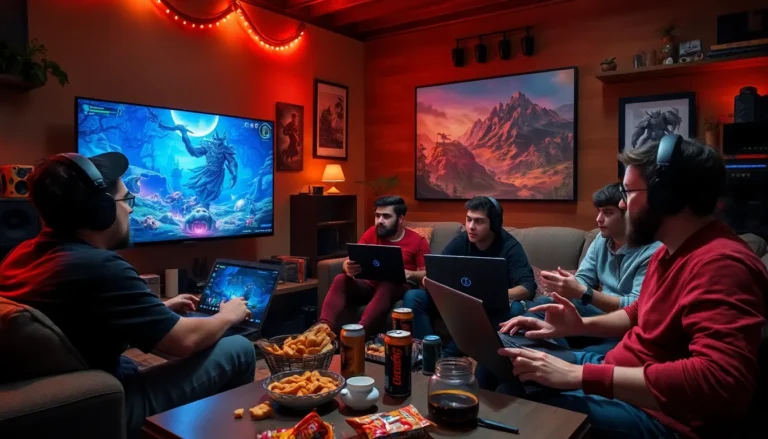Table of Contents
ToggleIn the ever-evolving world of AI, the battle of the bots is heating up. Grok 3, ChatGPT, and Gemini are three contenders vying for the title of conversational heavyweight champion. Each brings its own unique flair to the table, but how do they stack up against one another?
Overview of Grok 3
Grok 3 showcases advanced conversational AI capabilities, positioning itself as a leading contender in the AI landscape. It emphasizes user engagement through various innovative features.
Key Features and Capabilities
Grok 3 offers real-time language processing. Contextual understanding stands out as a significant strength. Users benefit from task automation and personalized interactions. The model integrates seamlessly with various platforms, enhancing accessibility. Advanced sentiment analysis allows for adaptive conversations, improving overall user experience. Robust APIs facilitate integration across diverse applications, making Grok 3 versatile.
Use Cases
Grok 3 serves various industries, including customer service, education, and marketing. In customer service, it streamlines support through automated response generation. Educational institutions utilize it for personalized tutoring experiences. Marketing teams leverage Grok 3 for targeted content creation and customer engagement strategies. Healthcare providers find value in using it for patient communication and support. Overall, Grok 3’s versatility enables it to address distinct needs in multiple sectors.
Comparison with ChatGPT

ChatGPT stands out in the arena of conversational AI, offering a unique set of strengths and limitations in comparison to Grok 3 and Gemini. Understanding these attributes helps in evaluating its place in the competitive landscape of AI models.
Strengths of ChatGPT
ChatGPT excels in language generation and contextual understanding. Its ability to produce human-like responses captures user interactions effectively. Engaging and coherent dialogues design its conversational style, making it appealing for various applications. Furthermore, it integrates easily with multiple platforms, enhancing accessibility for users. Robust training on diverse datasets allows ChatGPT to understand a wide range of topics. Businesses often leverage its capabilities for customer support, content creation, and educational tools. Advanced features, such as conversation memory, enable it to maintain topic continuity, improving user experience across prolonged interactions.
Limitations of ChatGPT
ChatGPT faces challenges related to factual accuracy in some instances. While it generates human-like text, occasional inconsistencies and errors can arise. Limited knowledge of niche subjects affects its performance in specialized areas. Additionally, its dependency on previous interactions may hinder effective communication in abrupt topic shifts. Contextual awareness, though generally good, can falter in complex conversations. The absence of real-time data updates restricts its ability to provide the most recent information. Lastly, some users report feeling that responses lack personalization, reducing engagement in specific use cases.
Comparison with Gemini
Gemini presents a noteworthy competitor in the AI landscape, showcasing distinct strengths and limitations in its capabilities compared to Grok 3.
Strengths of Gemini
Gemini excels in natural language understanding, enabling nuanced conversations with users. Its ability to generate contextually relevant responses sets it apart from many competitors. Data integration ensures that it accesses real-time information, enhancing its response accuracy. Developers designed Gemini to adapt quickly to user feedback, fostering improved interaction over time. Versatility in application appeals to various industries, including finance and healthcare, where precise, timely communication is essential. Furthermore, Gemini’s robust security measures safeguard user data, creating a trustworthy environment for sensitive interactions.
Limitations of Gemini
Despite its advantages, Gemini does face challenges. Complexity in its algorithms can lead to slower response times, particularly during high-demand periods. Users sometimes report inconsistencies in its responses when engaging in complex discussions. Additionally, Gemini’s training data may not be as extensive as some leading competitors, limiting its knowledge in specialized topics. The interface lacks some of the user-friendly features offered by alternatives, which can affect overall user experience. While Gemini provides real-time data access, sporadic connectivity issues may hinder its performance in certain situations.
Key Differences Among Grok 3, ChatGPT, and Gemini
The competitive landscape features unique strengths and limitations across the three AI models: Grok 3, ChatGPT, and Gemini. Each serves specific user needs in varied contexts.
Performance Metrics
Grok 3 thrives on real-time language processing and advanced contextual understanding. It excels in sentiment analysis, providing adaptive conversations tailored to users. ChatGPT focuses on generating human-like responses but struggles with factual accuracy and consistency. Response times may lag during abrupt topic shifts. Gemini demonstrates robust natural language understanding, offering contextually relevant answers and real-time data integration. Users benefit from its adaptability to feedback, although slower response times can occur during peak demand. Overall, Grok 3 leads in real-time engagement, while ChatGPT’s strong points lie in conversation continuity.
User Experience
Grok 3 emphasizes user engagement through seamless platform integration. It supports personalized interactions across industries, enhancing the overall experience. Users of ChatGPT appreciate its conversational style, which makes interactions feel engaging and fluid. However, the limitations in personalization can diminish user satisfaction in specific contexts. Gemini offers timely, precise communication due to its strong data integration features. Yet, its interface could benefit from more user-friendly options to enhance overall accessibility. While Grok 3 provides adaptability through contextual analysis, ChatGPT remains popular for its relatable interaction style.
The competition among Grok 3, ChatGPT, and Gemini highlights the diverse capabilities of conversational AI. Grok 3 stands out with its real-time processing and advanced contextual understanding, making it ideal for industries requiring personalized interactions. ChatGPT captivates users with its human-like responses but falls short in factual accuracy and personalization. Gemini impresses with its natural language understanding and real-time data access, although it faces challenges with response times and interface usability. Each model has its strengths and weaknesses, allowing users to choose based on their specific needs and preferences in the evolving AI landscape.







